
On 15 Oct 1990, the first arrival of killer bees in the U.S. was recorded in Hidalgo, as the dangerous insects spread up from Mexico into the southern tip of Texas. The killer bees earned their nickname in the media from their more intense defensive swarming behaviour than shown by native bees. Africanized honey bees, better known as killer bees, originated from the cross-breeding of tropical African bees imported into a South American country for experimental work. Since the 1950s, the killer bees extended their range northward through Central America.
Three years later, on 18 Jun 1993, killer bees were recorded as having spread into Arizona. An article on the Arrival of Africanized Honey Bees in Arizona gives more details on the spread of the AHBs, their effects and the first human fatalities there.

On 15 Oct 1930, Herbert H. Dow died, founder of the Dow Chemical Company, a pioneer the modern American chemical industry. Today's book pick is: Herbert H. Dow,: Pioneer in creative chemistry,, by Murray Campbell, Harrison Hatton who describes Dow's contribution to the development of industrial chemistry, with ample quotations from letters, diaries, notebooks and company records. Lessons learned by Dow as he progressed from the lab were the problems of scalability: concocting something in a beaker would be followed by unpleasant surprises as it would be totally different to put it together on a larger, commercial scale.
It is available from Amazon, typically about Used from $1.95. (As of earlier time of writing - subject to change.)
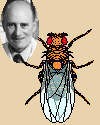 | The genes are the atoms of heredity. |
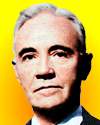 | If the fit between South America and Africa is not genetic, surely it is a device of Satan for our frustration. |
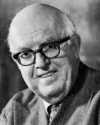 | A good many times I have been present at gatherings of people who, by the standards of the traditional culture, are thought highly educated and who have with considerable gusto been expressing their incredulity at the illiteracy of scientists. Once or twice I have been provoked and have asked the company how many of them could describe the Second Law of Thermodynamics. The response was cold: it was also negative. Yet I was asking something which is about the scientific equivalent of: Have you read a work of Shakespeare’s? |
| Before you look at today's web page, see if you can answer some of these questions about the events that happened on this day. Some of the names are very familiar. Others will likely stump you. Tickle your curiosity with these questions, then check your answers on today's web page. | |
| Births | |
 | An Italian physicist, born 15 Oct 1608, invented the barometer. The barometer experiment using “quicksilver” filling a tube then inverted into a dish of mercury, carried out in Spring 1644, made his name famous. Can you name this scientist? |
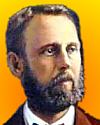 | On 15 Oct 1829, Asaph Hall was born, the American astronomer who discovered and named the two moons of Mars. What are the names of the two moons of Mars? |
| Deaths | |
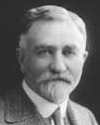 | Herbert Henry Dow (1866-1930) was a pioneer in U.S. chemical industry who founded the Dow Chemical Company. As a young man Dow entered the rudimentary chemical industry of the 1890s by inventing an entirely new method of extracting an element from the prehistoric brine trapped underground at Midland, Mich. What was this element? |
 | Herbert Copeland (1902-1968) was an American biologist who proposed distinguishing two biological kingdoms in addition to the long-standing two for plants and animals. For classification of the lower organisms, he split microorganisms into two kingdoms. What two kingdoms did Copeland name within the classification of microorganisms? |
| Events | |
 | On 15 Oct of a certain year, the arrival of killer bees was first observed in the U.S. after they had been spreading via Mexico from Central and South America into Texas. Their sometimes deadly, more intense defensive swarming behavior than native bees earned them the nickname “killer bee” in the media. In which South American country did the cross-breeding of African bees create the so-called killer bees? |
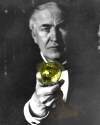 | On 15 Oct 1878, Thomas Edison established the Edison Electric Light Company in N.Y. City. It was followed in 1882 by the first investor-owned electric utility, that provided service for the 400 lamps of 85 customers in New York City. This Edison Electric Light Company and its technological heritage became a part of a now well-known U.S. company in 1892. Can you name this present company? |
Fast answers for the previous newsletter for October 14: Japan • the shape of the earth • helium • quasi-stellar object • krypton • Chuck Yeager.
 If you enjoy this newsletter, the website, or wish to offer encouragement or ideas, please send feedback by using your mail reader Reply button.
If you enjoy this newsletter, the website, or wish to offer encouragement or ideas, please send feedback by using your mail reader Reply button. Your click on a Facebook, StumbleUpon, or other social button on the site webpages is also a welcome sign of appreciation. Thank you for using them.
© This newsletter is copyright 2020 by todayinsci.com. Please respect the Webmaster's wishes and do not put copies online of the Newsletter — or any Today in Science History webpage. (If you already have done so, please remove them. Thank you.) Offline use in education is encouraged such as a printout on a bulletin board, or projected for classroom viewing. Online, descriptive links to our pages are welcomed, as these will provide a reader with the most recent revisions, additions and/or corrections of a webpage. For any other copyright questions, please contact the Webmaster by using your mail reader Reply button.
--
If you do not want to receive any more newsletters, Unsubscribe
To update your preferences and to unsubscribe visit this link
Executive Real Estate Business Class
-
"It was like a man with wings. It wasn't like anything you'd see on TV or in a monster movie." ...
About the publisher
Search This Blog
Blog Archive
-
▼
2020
(1542)
-
▼
October
(171)
- The Compass: Iceland
- A Very Special Halloween Edition Of Our Scariest S...
- On This Day for October 31 - Luther's Ninety-five ...
- Newsletter for Saturday 31 October.
- CORONAVIRUS UPDATE: Why some people are supersprea...
- October 31: Martin Luther Challenges the Pope, Mic...
- PHOTOGRAPHY: Capturing America's pent-up energy to...
- The Terrifying Story Of The Mothman, The Little-Kn...
- The Roundup Top Ten from History News Network
- On This Day for October 30 - Henry Tudor crowned k...
- Newsletter for Friday 30 October.
- October 30: Tsar Nicholas II 'October Manifesto', ...
- ANIMALS: Will oil drilling spread across spectacul...
- On This Day for October 29 - Collapse of U.S. stoc...
- Newsletter for Thursday 29 October.
- October 29: End of China's One-Child Policy and Lo...
- YOUR WEEKLY ESCAPE: The science of the heebie-jeebies
- SCIENCE: Will every hurricane season be like this?
- The Latest News from History News Network
- On This Day for October 28 - Statue of Liberty ded...
- Newsletter for Wednesday 28 October.
- October 28: Fingerprints, Prohibition and the Blac...
- TRAVEL: When do Americans say they’ll fly again?
- Were vampire hunters real? Subscribe to find out.
- On This Day for October 27 - Anwar Sadat and Menac...
- Newsletter for Tuesday 27 October.
- October 27: China's Population Reaches 1 Billion a...
- HISTORY: Rush of early voters spurs talk of a record
- New This Week on History News Network
- On This Day for October 26 - Park Chung Hee assass...
- Newsletter for Monday 26 October.
- October 26: Beginning of the Red Cross and the Gun...
- FAMILY: When the best advice to your kids isn't yours
- On This Day for October 25 - English triumph at Ag...
- Newsletter for Sunday 25 October.
- October 25: The Great United Nations China Switch ...
- The Compass: Japan
- On This Day for October 24 - United Nations establ...
- Newsletter for Saturday 24 October.
- October 24: Two Great Historical Stock Market Crashes
- CORONAVIRUS UPDATE: How to fight the COVID-19 'inf...
- PHOTOGRAPHY: The best photojournalism of the decade
- What did Cleopatra look like? | Charles and Diana’...
- 11 Spooky Urban Legends Based On Terrifying True S...
- The Roundup Top Ten for October 23, 2020
- On This Day for October 23 - U.S. and French troop...
- Newsletter for Friday 23 October.
- October 23: US National Debt, an Old Fossil and th...
- ANIMALS: They were researching cheetahs. Iran call...
- Love the show Weird But True? Get more WBT with ev...
- Early Holiday Savings at the HISTORY Store
- Introducing the Britannica All New Kids' Encyclope...
- On This Day for October 22 - Cuban missile crisis,...
- Newsletter for Thursday 22 October.
- YOUR WEEKLY ESCAPE: These prehistoric footprints t...
- October 22: Greenwich Mean Time, the Cuban Missile...
- SCIENCE: Will the next generation fight a pandemic...
- On This Day for October 21 - Magellan's discovery ...
- The Latest News from History News Network
- October 21: Battle of Trafalgar, China Occupies Ti...
- TRAVEL: We found 50 stories in 50 states for ‘Amer...
- On This Day for October 20 - Opening of Sydney Ope...
- Newsletter for Tuesday 20 October.
- October 20: On This Day in History
- HISTORY: Why do we have the Electoral College?
- Join photographer Pete Muller for an online conver...
- New This Week on History News Network
- On This Day for October 19 - Surrender of Lord Cor...
- Newsletter for Monday 19 October.
- October 19: On This Day in History
- FAMILY: Letting kids take charge
- The lost heirs of Henry VIII
- On This Day for October 18 - Alaska Purchase appro...
- Newsletter for Sunday 18 October.
- October 18: French Protestants, The Alaska Purchas...
- The Compass: Portugal
- On This Day for October 17 - Mother Teresa awarded...
- Newsletter for Saturday 17 October.
- October 17: Burma Railway, OPEC Oil Embargo and Ra...
- CORONAVIRUS UPDATE: Who will be first in line for ...
- PHOTOGRAPHY: How COVID-19 changed our work
- The 25 Best Horror Movies Of All Time — And The Ch...
- This Week's Roundup Top Ten from History News Network
- On This Day for October 16 - Marie-Antoinette guil...
- Newsletter for Friday 16 October.
- October 16: Battle of Leipzig, Mao's Long March an...
- ANIMALS: The wildlife photo of the year
- Challenge grant: Help unlock important funds for w...
- On This Day for October 15 - Final conference on A...
- Newsletter for Thursday 15 October.
- October 15: Napoleon's Exile, the 1st Oral Contrac...
- YOUR WEEKLY ESCAPE: A murder mystery 430,000 years...
- SCIENCE: Will the next generation fight a pandemic...
- The Latest News on History News Network
- On This Day for October 14 - Battle of Hastings, D...
- Newsletter for Wednesday 14 October.
- Historic Trends in our time may be overcome with g...
- October 14: William the Conqueror, Robert the Bruc...
- The Embarrassing Final Moments Of 10 Revered Histo...
- TRAVEL: Does your wine taste like fire?
-
▼
October
(171)
-
Blogroll
-
About
HistoryFact










0 comments:
Post a Comment